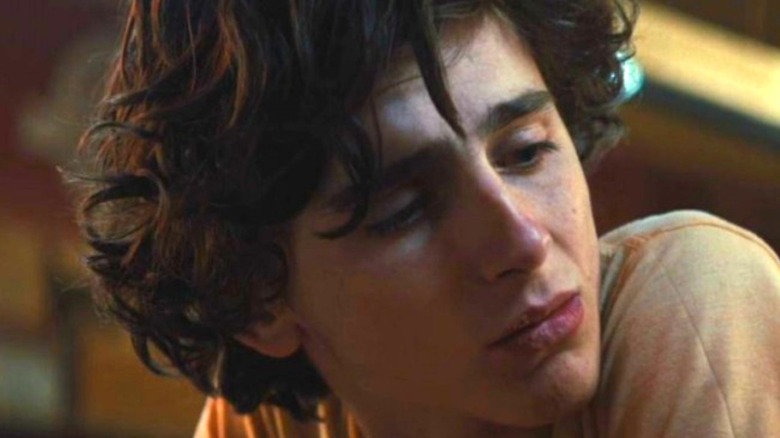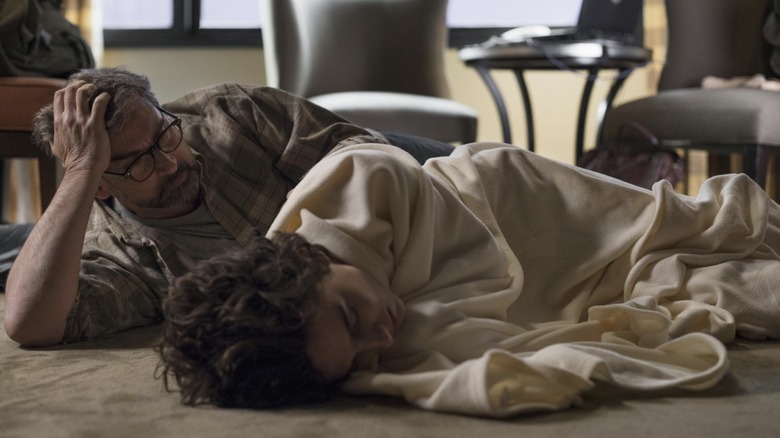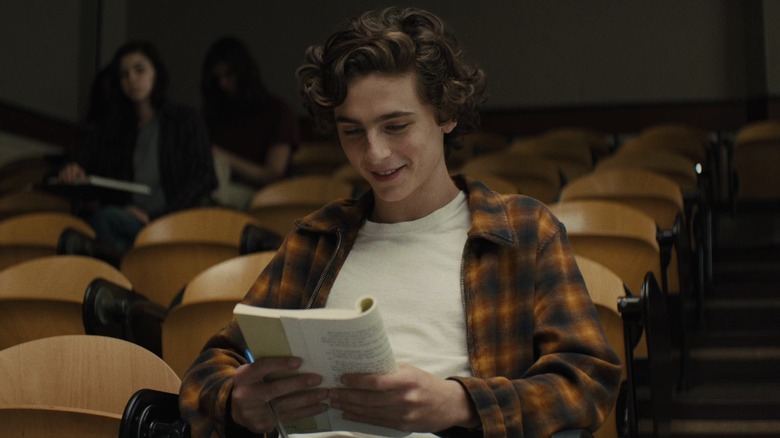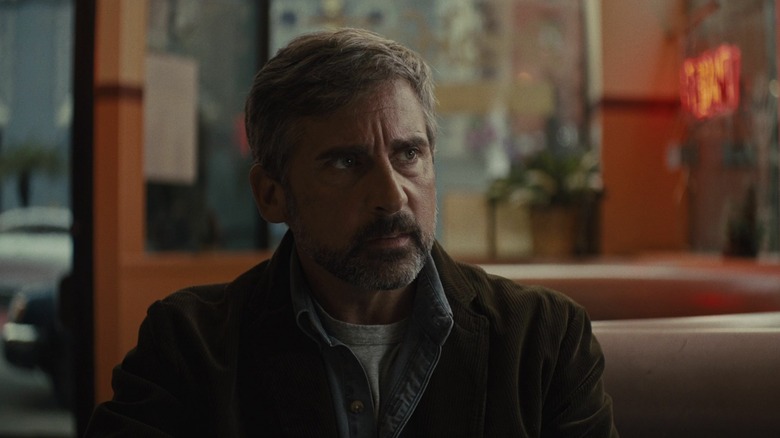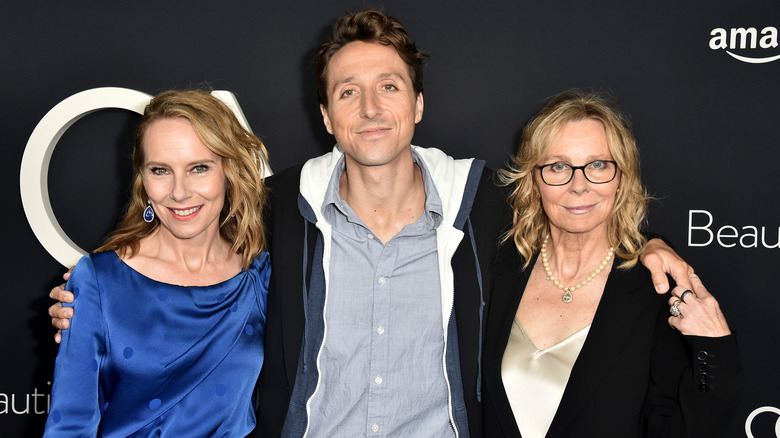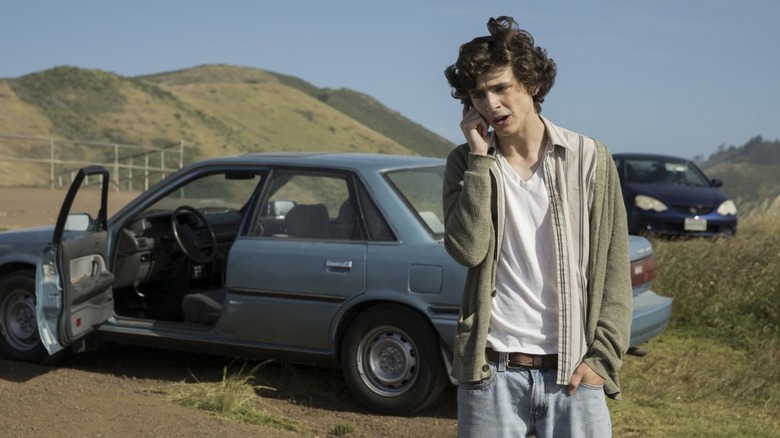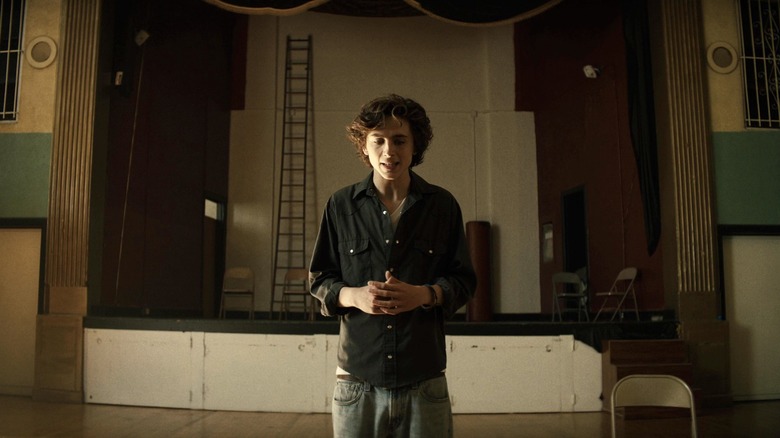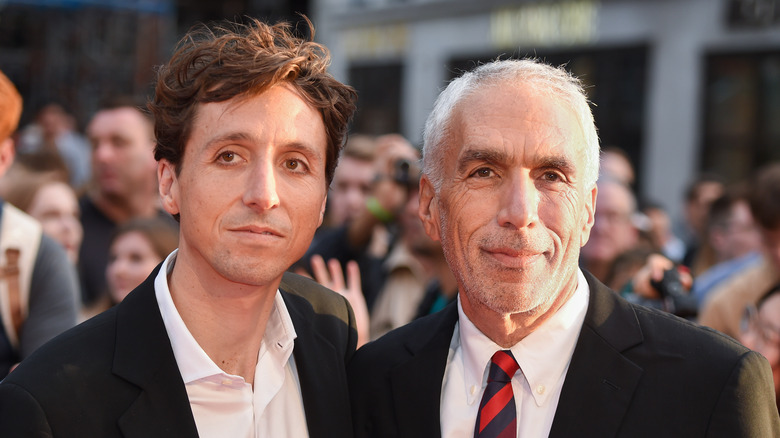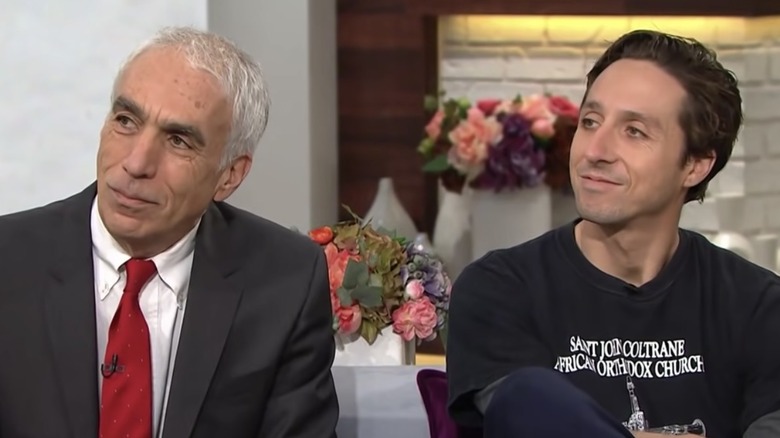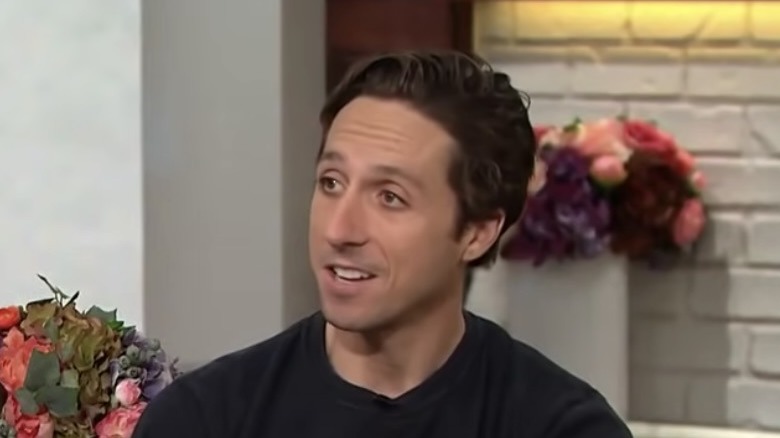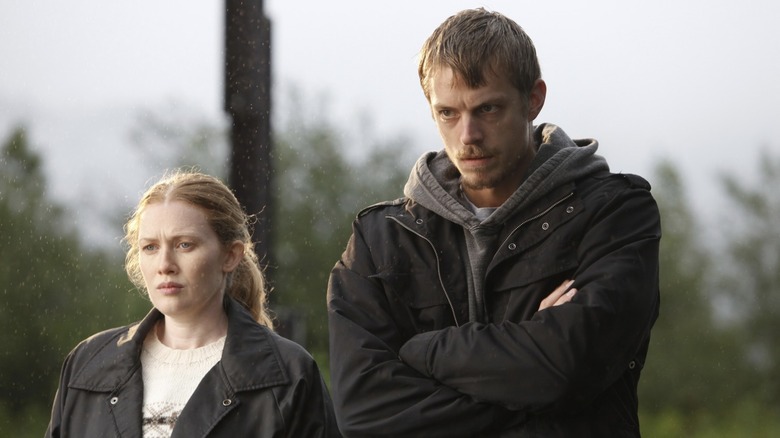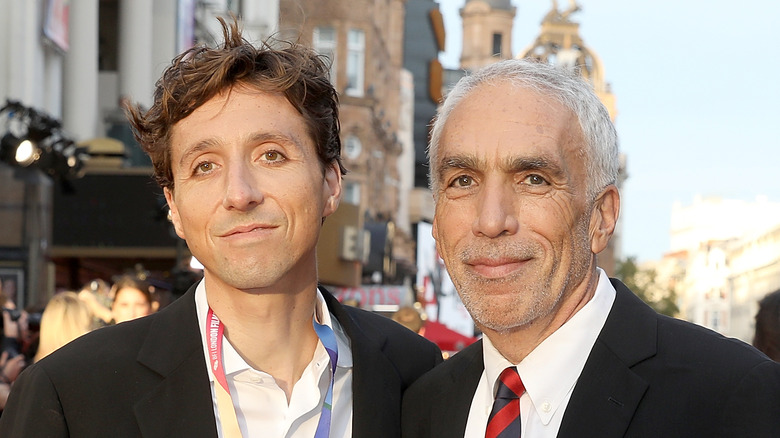Everything Beautiful Boy Doesn't Tell You About The True Story
Trigger warning: This article discusses themes of substance misuse and addiction.
Director Felix Van Groeningen's drama "Beautiful Boy" is based upon a pair of bestselling memoirs by journalist David Sheff and his son Nic Sheff.
The film follows the lives of Nic and his family from Nic's teen years into his 20s during his years-long struggles with active addiction, recovery, and relapse. The film focuses on the experience of Nic (Timothée Chalamet) and his father David (Steve Carell), but it also explores how Nic's self-destructive behavior affects his mother Vicki (Amy Ryan), his step-mother Karen (Maura Tierney), and his younger siblings Jasper (Christian Convery), and Daisy (Oakley Bull).
Like other films about addiction and recovery, "Beautiful Boy" explores the emotional depths and darkness of Nic's journey. But this film has a hopeful message, which Nic summarized in an interview with ABC News: "As long as there is life, that's when there's always hope."
During a speech for the 2018 Colorado Health Symposium, David explained that the film authentically does "capture the emotion of what it is like," and watching it was difficult because it was so realistic and haunting. However, he also noted that some details were changed because like with any film based on a true story, there are subtle differences between the theatrical version and reality.
So, keep reading to learn everything "Beautiful Boy" doesn't tell you about the true story.
Warning: spoilers ahead.
Nic struggled with addiction for a decade
Inevitably, long periods of time have to be condensed into a shorter time frame for a feature-length film. In the case of "Beautiful Boy," the same young actors portray Nic's younger siblings, giving the illusion the events happen during an abbreviated period of time.
Meanwhile, three actors portray Nic: Timothée Chalamet plays Nic as a young man for the bulk of the film, with Jack Dylan Grazer and Kue Lawrence playing younger versions of Nic in limited flashbacks.
This makes it seem like Nic's struggles with active addiction, relapse, and recovery lasted for a shorter period than was the case in reality. Nic began drinking and smoking cannabis in middle school, and by the end of high school, he was using drugs daily.
In a 2018 interview with Today, Nic shared how when he started doing crystal meth, his life completely changed, saying, "I think as soon as that drug hit me, it was the feeling I'd been looking for my whole life. I spent the next 10 years kind of chasing that feeling."
In the same interview, David told Today, "I spent 10 years trying to save his life. That's what I would tell other people who are struggling with this now, 'Don't give up.'" In the film, the rehabilitation programs Nic attended emphasize how relapse is part of recovery, and this was Nic's experience in life. In an interview with StudiocanalUK, Nic said, "I think honestly, it's one of the best portrayals of active addiction I've ever seen on screen."
If you or anyone you know is struggling with addiction issues, help is available. Visit the Substance Abuse and Mental Health Services Administration website or contact SAMHSA's National Helpline at 1-800-662-HELP (4357).
Nic dropped out of Berkeley during his Freshman year
In the film, after getting accepted to every college he applied to, Nic goes to rehab before attending college on the East Coast. As David Sheff shared in his essay "My Addicted Son" for The New York Times Magazine, Nic was an excellent student in high school. He wrote for the newspaper and was the recipient of the Ernest Hemingway Writing Award. Nic even published an article in Newsweek as a high school student. The summer between his junior and senior years, Nic attended a summer program at the American University in Paris. From the outside, Nic had a bright future.
Even before Nic started his freshman year in college, there were signs he was struggling. Nic was arrested for failing to appear in court for marijuana possession. Contrary to what "Beautiful Boy" shows, Nic actually first enrolled in UC Berkeley, where he began dealing crystal meth to fund his growing addiction. After only three months, Nic dropped out of UC Berkeley, which was his father's alma mater (per The Hollywood Reporter).
As David wrote in "My Addicted Son," he encouraged Nic to go to rehab, but since Nic was over 18 and a legal adult, he didn't have to go. Instead, Nic vanished for a week, but eventually, as depicted in the film, he went to the Ohlhoff Recovery Program in San Francisco.
Nic turned to sex work to fund his addiction
During his struggle with active addiction, Nic found himself homeless a number of times and occasionally partook in illegal activities in order to purchase meth and heroin. In the film, Nic even steals from his little brother Jasper's piggy bank, which happened in real life too. In an interview with ABC News, Nic said, "The thing that I regret the most is stealing the money from my little brother."
Although "Beautiful Boy" explores Nic's homelessness and stealing to buy drugs, the film doesn't depict Nic turning to sex work to fund his addiction. Instead, the film addresses the intersection between sex work, homelessness, and addiction through a character that David takes to lunch in exchange for asking her questions during his quest to understand his son's choices and the nature of addiction.
While the film doesn't go into Nic's experience as a sex worker, the real Nic Sheff has openly discussed this part of his life and explained how it filled an emotional need as well as a financial one.
In a blog post for The Fix, Nic wrote, "I mean, don't get me wrong, I needed the money. But, more than anything else, I wanted to feel beautiful. I could've made money in other ways. Prostitution was something I wanted to do" (per Out Magazine). He goes on to describe how there were other kids engaging in sex work for similar reasons because like him, "They wanted to feel wanted."
Nic almost lost his arm to an infection from a dirty needle
Nic has candidly discussed the rollercoaster of his life with meth, explaining to Yahoo Life that "The moment that [meth] hit me I was instantly addicted to it. Every time I thought it couldn't get worse, it did." While "Beautiful Boy" delves into various moments of things getting worse for Nic, there is one particularly harrowing experience that the film leaves out.
As David Sheff shared in an essay for The Guardian, "Once, an ER doctor called to say he might have to amputate Nic's arm, which had become infected because of IV drug use." Almost losing his arm is one of the many ways Nic's addiction to meth and heroin manifested through nightmarish experiences.
In an interview with Alison Rose with FlickDirect, Nic shared how the filmmakers decided to not include him almost losing his arm like Harry at the end of "Requiem for a Dream" because they didn't want to glamorize or sensationalize the story. Although Nic wrote about having this infection in his memoir "Tweak," the filmmakers wanted to make a film that was universally relatable and showed both sides, rather than making a more traditional and familiar movie about an addict descending into the depths of addiction.
If you or anyone you know is struggling with addiction issues, help is available. Visit the Substance Abuse and Mental Health Services Administration website or contact SAMHSA's National Helpline at 1-800-662-HELP (4357).
Nic's mother, Vicki Sheff-Cahan, is also a journalist
"Beautiful Boy" might be based on a pair of bestselling memoirs written by David and Nic Sheff, but they aren't the only writers in the family. As reported by The Hollywood Reporter, Vicki Sheff-Cahan, David's first wife and Nic's mother, is also a journalist, who has written for People and Playboy Magazine. Vicki is a freelance writer, and as depicted in the film, she moved to Los Angeles after she and David and divorced.
In 2018, Vicki shared her experiences as the mother of a child struggling with addiction in an article for People when "Beautiful Boy" came out. Vicki wrote about how watching the film made her relive the hope she had for Nic's future when he was living in Los Angeles and was sober for over a year: "I was sure the warmth of sobriety had liberated him from the darkness of addiction. Finally, he'd learned how to stay sober. Then he disappeared."
Vicki, like David, never gave up on Nic throughout his active addiction, relapses, and recovery. In People, Vicki wrote, "Although David and I didn't always see eye to eye on how to help Nic, we never shut each other out." While the film focuses on David and Nic's relationship, it does also highlight this teamwork between David and Vicki to help their son.
Nic was diagnosed as bipolar and takes medication to manage his symptoms
As Nic shared in an essay for The Fix, he was diagnosed with bipolar disorder in 2003 (per Salon). Nic wrote that the symptoms in the DSM manual the therapist handed him were "basically the story of my life." Despite recognizing the symptoms, Nic resisted the bipolar diagnosis and refused to take medication for it, as he didn't want to contribute to the profits and system of Big Pharma.
He kept relapsing with his drug use, while his friends who were treating their diagnosed disorders with prescribed medication were staying sober. Nic wrote, "I'm not saying that my being bipolar was the only reason I kept relapsing. But it definitely made staying sober a whole lot harder."
While he doesn't remember what was the turning point for him to decide to take medication for his bipolar disorder, he did decide to take a new approach with it. Nic wrote for The Fix, "When I got sober this last time, I made a commitment to do whatever it was my doctor suggested, and that included starting on a regimen of anti-depressants, mood stabilizers, and anti-psychotic medication."
Nic now accepts his bipolar diagnosis and believes medication, therapy, and 12-step work has helped him stay in recovery and sober despite his struggles with active addiction and a history of relapsing.
If you or someone you know is struggling with mental health, please contact the Crisis Text Line by texting HOME to 741741, call the National Alliance on Mental Illness helpline at 1-800-950-NAMI (6264), or visit the National Institute of Mental Health website.
Nic attended rehab five times
At the end of "Beautiful Boy," we learn Nic had been sober for eight years when the film came out. This sobriety was hard won and didn't begin after the overdose that lands him in the hospital at the end of the film. Nic attended rehabilitation programs five times and relapsed repeatedly (per Oprah). For years, Nic's sobriety was precarious. As reported by The New York Times, when Nic's father David had a brain hemorrhage, Nic relapsed after 18 months of sobriety.
Despite attending multiple rehabilitation programs, Nic believes he learned something important from each experience. Nic told NPR that he learned both about himself and the disease of addiction each time he went to rehab and that when he relapsed, it wasn't because of a failure of the treatment centers, but rather, "it just was that I just wasn't ready." David told NPR the last time Nic relapsed and went to rehab, he did it on his own, because he knew where using led.
In an essay for The Fix, Nic shared how contrary to the opinion voiced by many in recovery, he regrets everything about his time struggling with active addiction, saying, "Recovering addicts say they're grateful to have learned from their mistakes. Personally, I wish I never made them" (per Salon). That's not to say Nic isn't grateful. Nic told Today, "I came away from [the film] feeling so grateful, and like I should never sweat the small stuff again, because I'm so lucky."
If you or anyone you know is struggling with addiction issues, help is available. Visit the Substance Abuse and Mental Health Services Administration website or contact SAMHSA's National Helpline at 1-800-662-HELP (4357).
David Sheff suffered a brain hemorrhage while writing his memoir
Although it was not depicted in the film, David Sheff had a brain hemorrhage while writing his memoir, "Beautiful Boy," and he had to learn to write again (per The New York Times). David's health scare derailed Nic's recovery journey, and he began using again after 18 months of sobriety. Both books were temporarily put on hold as David recovered and Nic got sober. David wrote on Oprah, "After my brain hemorrhage and Nic's last relapse, it's a miracle that we survived, never mind that we completed these books."
The film depicts with painful clarity how Nic's addiction took over David's life, threatening his marriage and stealing attention and energy from his other small children. In his memoir, David shares that, like many parents of adult children dealing with addiction, he found support by attending Al-Anon meetings, and learned to have healthy boundaries with his son, rather than continuing the cycle of enabling and codependency.
David wrote in his memoir that his brain hemorrhage helped him understand and accept that life is short, so he needed to redirect some of his own fixation and worrying about his son: "I could not change Nic, only me. And so instead of focusing on Nic's recovery, since then I have focused on mine" (per Allies in Recovery).
Nic credits reading his father's memoir as a turning point in his recovery
In an essay for The Fix, Nic wrote that reading his father's memoir made him realize he couldn't pretend that his addiction didn't affect his family or others, which was a turning point for him (per Industria Movies). Although he suffered a relapse while both his and his father's books were being written, Nic remained committed to his recovery.
David was able to finish his book after taking a hiatus due to his brain hemorrhage, and Nic explained in an interview with Matt Lauer that reading his father's memoir offered a new perspective. He realized he wasn't using drugs in a vacuum and that his actions affected the ones he loves.
Nic further elaborated on this experience to The New York Times: "Reading Dad's book, the thing that popped out that I hadn't fully understood was how much I hurt people." He goes on to describe his feeling that his own self-destruction was nobody else's business because when you're an addict, "All you see is your own pain. Part of my recovery is knowing that all these people are depending on me."
If you or anyone you know is struggling with addiction issues, help is available. Visit the Substance Abuse and Mental Health Services Administration website or contact SAMHSA's National Helpline at 1-800-662-HELP (4357).
Nic got married in 2011 and lives in Los Angeles
As reported by Datebook, Nic married actress and writer Jette Newell in 2011 and they live in LA, where Nic's younger siblings also live. In an essay for The Fix, Nic revealed that he and Jette didn't meet in rehab or 12-step meetings, as many people in recovery do, because Jette doesn't have a history of addiction (per Salon). Instead, their connection goes further back, to a time before Nic was struggling with addiction since they met in middle school.
Their paths diverged after childhood but intersected again 15 years later, when Nic saw Jette at an art opening in San Francisco. Nic described their connection for The Fix, "We were best friends throughout middle school and I was in love with her the whole time" (per Salon). For Nic, having a healthy relationship with his wife and his family is one of the miracles sobriety has given him. As he shared on Today, he is grateful he can now find joy in the simple things — like his dogs — and his life is so much better because of his sobriety.
Nic became a television writer
Nic and his wife moved to Los Angeles from Savannah, Georgia. After writing multiple books and essays, Nic made the move to television in 2013, starting with writing an episode for "The Killing" and two episodes of "Recovery Road" (per IMDb).
Nic explored his anxiety and excitement with this career shift in an essay for the Fix, describing what he felt when he started working in television, which was "the big miracle" of his sobriety: "With the miracle comes fear and stress, self-doubt and all those feelings that made me want to get high in the first place" (per Salon).
Despite the fear he would sabotage himself by relapsing, Nic felt confident in his ability to rise to the occasion and remain committed to his sobriety by being honest with himself and others about his anxieties about taking on a new challenge.
Nic's work in television paid off, as he worked as both a writer and producer for the Netflix series "13 Reasons Why" (per The Hollywood Reporter). Nic wrote an op-ed in 2017 for Vanity Fair, explaining how his own suicide attempt informed his desire to realistically portray Hannah's suicide in the series.
If you or anyone you know is having suicidal thoughts, please call the National Suicide Prevention Lifeline at 1-800-273-TALK (8255).
Nic has published five books
Besides Nic's 2008 memoir "Tweak," which partly formed the basis for "Beautiful Boy," he has written four other books. "Beautiful Boy" notes that at the time of its release in 2018, Nic was eight years sober, and according to Datebook, his last relapse came after the publication of "Tweak." The experience of this relapse led to Nic's next book, "We All Fall Down: Living with Addiction," detailing his ongoing struggles with relapse and recovery.
While fans of "Beautiful Boy" may primarily know Nic as a memoirist, he has also written fiction. In 2014, he published his first novel, "Schizo" and followed it up in 2016 with "Harmony House." In an essay for The Fix, Nic shared how he felt a sense of relief in writing fiction because it meant that he could take a break from rehashing his history of addiction when talking about his writing (per Salon).
However, in 2019, Nic revisited the topic of addiction and co-authored "High: Everything You Want to Know About Drugs, Alcohol, and Addiction" with his father. This is a non-fiction book dedicated to helping parents and teens address the myriad reasons teens experiment with drugs and risk addiction.
In an informative feature for the Partnership to End Addiction, Nic and David shared how the book explores the science of addiction and also the struggles of growing up that can lead to drug use and addiction.
If you or anyone you know is struggling with addiction issues, help is available. Visit the Substance Abuse and Mental Health Services Administration website or contact SAMHSA's National Helpline at 1-800-662-HELP (4357).
